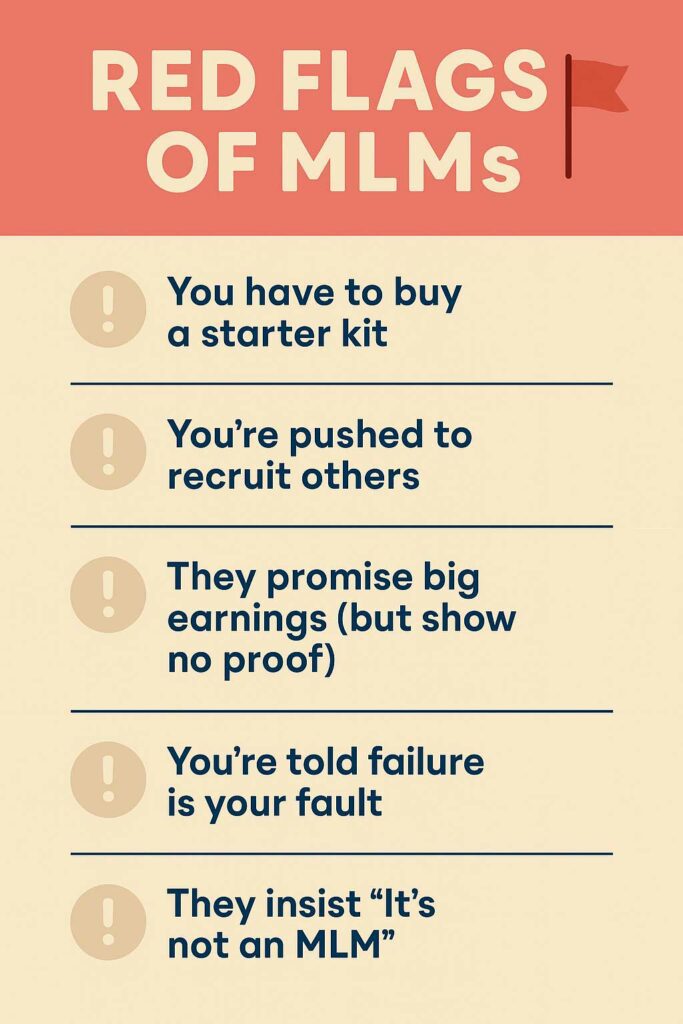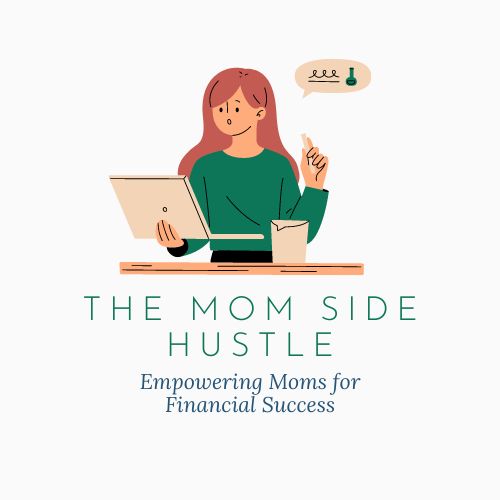Let’s talk about MLM vs affiliate marketing—because too many moms are being misled by shady “business” promises.
Let’s clear this up. Lately, more and more people online are using the term affiliate marketing to describe their business. However, what they’re actually promoting is often something very different—an MLM.
If you’ve ever felt unsure about the difference, you’re in the right place. The truth is, MLM vs affiliate marketing is not just a small distinction—it’s a critical one. One model empowers moms with flexible, legitimate income. The other exploits them with false promises, hidden fees, and toxic pressure to recruit others.
MLM vs Affiliate Marketing: Why One Helps Moms Earn and the Other Exploits Them
MLMs often hide behind trendy terms like brand ambassador or social selling. They make it sound like you’re running a real business. But underneath, you’re stuck in a broken system designed for the people at the top—not you.

Affiliate marketing, on the other hand, doesn’t ask you to recruit, cold-message friends, or spend money to get started. It’s transparent, scalable, and actually sustainable for moms who want to earn money on their own terms.
In this post, I’ll break down exactly how they differ—and why MLMs are never the answer.
What Is an MLM (and Why It’s a Problem)
MLM stands for multi-level marketing. These companies promote themselves as flexible income opportunities—perfect for moms who want to “work from home” or “be their own boss.” But what they’re really selling is a system built to benefit only those at the top.
In an MLM, you don’t just sell products. You’re expected to recruit others to join the company under you. Your earnings come not from product sales alone, but from building a “team” of sellers—who then recruit more sellers beneath them. It’s a cycle that closely mimics a pyramid scheme.
Here’s what MLMs often require from their members:
- Purchasing starter kits or bulk inventory up front
- Hitting monthly sales or volume minimums
- Recruiting friends, family, and strangers to join
- Hosting parties, sending cold messages, or selling on social media
- Spending your own money to stay “active” in the company

This model doesn’t just drain your wallet. It also relies heavily on emotional manipulation. MLMs use empowering language—calling you a “boss babe” or “mompreneur”—while pushing impossible expectations. If you fail, it’s never the system’s fault. You just “didn’t want it badly enough.”
But the truth is staggering. According to the FTC, over 99% of MLM participants lose money or barely break even. Most never recover what they spend on inventory, fees, or events.
Despite all the flashy branding, MLMs are legal scams disguised as entrepreneurship. They don’t offer freedom—they trap moms in debt, guilt, and false hope. And that’s exactly why they have no place in the modern side hustle space.
What Is Affiliate Marketing (and Why It’s Legit)
Affiliate marketing is a simple, honest way to earn money online by recommending products you trust and use. You don’t have to buy inventory, recruit people, or pressure your friends.
Here’s how it works:
You sign up for an affiliate program. You get a special link to a product. When someone clicks that link and makes a purchase, you earn a commission. That’s it.
There are no team sales, no minimum quotas, and no awkward DMs. Your income is based on content and conversions—not how many people you bring in beneath you.
Affiliate marketing can be done through:

- Blog posts that review or recommend products
- Social media platforms like Instagram or TikTok
- Email newsletters or niche websites
- YouTube videos, Pinterest pins, or product roundups
Popular affiliate programs include Amazon Associates, ShareASale, RewardStyle (LTK), and even direct partnerships with brands you love.
The best part? It grows over time. The more helpful content you create, the more potential your links have to earn. It’s real, scalable income—and you never have to pitch a single friend or pay to get started.
MLM vs Affiliate Marketing: Why the Confusion Exists
If you’ve ever seen someone say they’re doing affiliate marketing—only to find out they’re actually in an MLM—you’re not alone. This confusion isn’t an accident. It’s part of a growing trend where MLM sellers rebrand themselves using legit-sounding language to avoid the stigma.
Instead of saying “I joined an MLM,” they’ll say things like:
- “I’m a brand ambassador”
- “I do affiliate sales”
- “I run my own business”
- “I’m a social seller”

It all sounds polished and professional. But underneath, it’s still the same MLM structure—recruitment-focused, inventory-based, and high-pressure. This language is used to make the model seem more modern and less exploitative, especially on platforms like Instagram and TikTok.
But real affiliate marketing isn’t about recruiting anyone. There are no team bonuses, no upline commissions, and absolutely no starter kits to buy. You don’t have to meet sales quotas, attend motivational Zoom calls, or convince your cousin to join your “team.”
Affiliate marketing is honest. You earn when your content helps someone make a buying decision—not when you pressure them into joining a scheme.
Side-by-Side Breakdown: Real vs Risky
Still unsure where you stand on MLM vs affiliate marketing? This side-by-side breakdown shows just how different they really are.
Only one of these models gives you control, freedom, and transparency. The other is designed to trap you with high costs and empty promises.
| Feature | MLMs (Multi-Level Marketing) | Affiliate Marketing |
|---|---|---|
| Cost to Join | High (starter kits, bulk inventory) | Free or low-barrier (just sign up online) |
| Income Source | Recruiting & personal sales | Commissions from product sales via links |
| Ownership | You don’t own the business | You own your content and links |
| Pressure to Recruit | Constant and expected | None—no team needed |
| Risk | High financial loss is common | Low to none with proper strategy |
| Transparency | Low—earnings often hidden or inflated | High—commission rates are clearly stated |
Affiliate marketing puts moms in control. MLMs do the exact opposite. The choice is clear.
Why Moms Are Targeted by MLMs
Moms are one of the biggest targets for MLMs—and it’s not by accident. These companies prey on emotional vulnerability, especially during major life transitions.
New moms often feel isolated, overwhelmed, and financially stretched. Others face job loss or are desperate for a flexible income to support their families. MLMs know this. They use carefully crafted messages like, “Don’t you want to stay home with your babies?” or “You could earn money while they nap!”
It sounds empowering—but it’s not. These so-called “opportunities” are built on guilt, not freedom.
MLMs package their pitch in feel-good slogans like:

- “Be your own boss!”
- “Join our supportive sisterhood!”
- “You’re just one hustle away from success!”
But behind the hashtags and hype are hidden quotas, upline pressure, and an endless cycle of recruiting just to break even.
I’ll never forget a mom I met in a parenting group. She had just lost her job and joined an MLM after someone promised her “unlimited earning potential.” Six months later, she was in debt, embarrassed, and afraid to tell anyone it hadn’t worked out. She didn’t fail—the system did.
The truth is, MLMs don’t empower moms. They exploit their desire to provide, connect, and succeed—all while making them feel like it’s their fault when it falls apart.
Real Red Flags of MLMs
If you’re not sure whether something is an MLM, these red flags usually say it all. And fast.
MLMs rarely come right out and say what they are. Instead, they bury the truth under hashtags, hype, and feel-good slogans. But once you know what to look for, the signs are hard to miss.
Watch out for these major warning signs:
- You have to buy a starter kit to “join” the opportunity
- You’re constantly encouraged to recruit others—not just sell products
- They promise big income but won’t show you actual numbers
- You’re told failure is your fault, even though the system is stacked against you
- They insist “It’s not an MLM” while describing something that clearly is

If it walks like an MLM and recruits like an MLM… it’s an MLM. And no, rebranding it as “social selling” doesn’t make it legit.
Bottom line? Real business models don’t require guilt trips, overpriced kits, or recruiting your cousin to pay the bills.
How to Actually Get Started with Affiliate Marketing
Affiliate marketing is one of the most beginner-friendly, low-risk ways to make real money online—and it’s 100% legit. You don’t need to be an expert or have a huge audience to get started. You just need a plan, a platform, and a little patience.

Here’s how to begin:
- Pick a niche you care about.
Think mom life, budgeting tips, travel, books, fitness, or meal planning. Choose something you already talk about, search for, or enjoy. - Create a platform.
Start a blog (check out my post on How to Start a Blog as a Mom), or build a presence on Instagram, YouTube, Pinterest, or TikTok. You don’t need to be on every platform—just pick one and start showing up. - Join legit affiliate programs.
Look into Amazon Associates, ShareASale, LTK (RewardStyle), or affiliate networks connected to brands you already use and love. - Share honest, helpful content.
The key is trust. Recommend products you actually believe in. Create posts that solve problems or answer questions. This isn’t about pushy sales—it’s about sharing value and getting paid when people take action.
Affiliate marketing grows over time, but it’s yours. You’re not beholden to uplines, quotas, or guilt trips. You build it your way, at your pace.
Want more ideas? Check out Weekend Side Hustles That Actually Work to see how affiliate income fits into a real mom’s schedule.
Final Thoughts: Protect Yourself, Mama
MLMs love to sell you on sisterhood, success, and staying home with your kids. But too often, they leave moms drowning in debt and self-doubt.
Affiliate marketing isn’t flashy. It won’t promise overnight riches or luxury cars. But it’s real. It’s honest. And it gives you control over your time, your values, and your income.
Yes, it takes time to grow. But it builds something sustainable—without guilt trips, overpriced kits, or shady tactics.
You don’t have to message your friends. You don’t need to “build a team.” And you absolutely shouldn’t have to sacrifice your self-worth just to feel like a boss.
Choose empowerment. Choose transparency. And most of all—choose you.
FAQs About MLM vs Affiliate Marketing
Yes, MLMs are legal in many countries—but that doesn’t make them ethical. As long as they claim to sell products and not just focus on recruitment, they skirt legality. However, many operate like pyramid schemes and cause real financial harm.
Direct sales often require you to buy and resell inventory—usually as part of an MLM. Affiliate marketing involves promoting products through unique links. You earn commission if someone buys, but you don’t handle the product or make anyone join.
Absolutely. It takes time, content creation, and strategy—but it’s a sustainable way to earn income. You’re not limited by quotas or recruitment. The more value you offer, the more you can earn.
MLMs use emotional tactics and community pressure. Many people truly believe in the opportunity because they’ve been sold a dream. Others feel stuck and defend it because they’ve already invested time and money.
Start with what you already love—books, products, parenting tips, etc. Pick one platform (blog, Instagram, YouTube) and create helpful content. Then join legit affiliate programs like Amazon Associates, LTK, or ShareASale. No buying inventory. No recruiting. Just honest sharing.

Jessi, a working mom turned entrepreneur, transformed her side hustle into a full-time venture post-layoff, inspiring moms to explore new financial opportunities.


